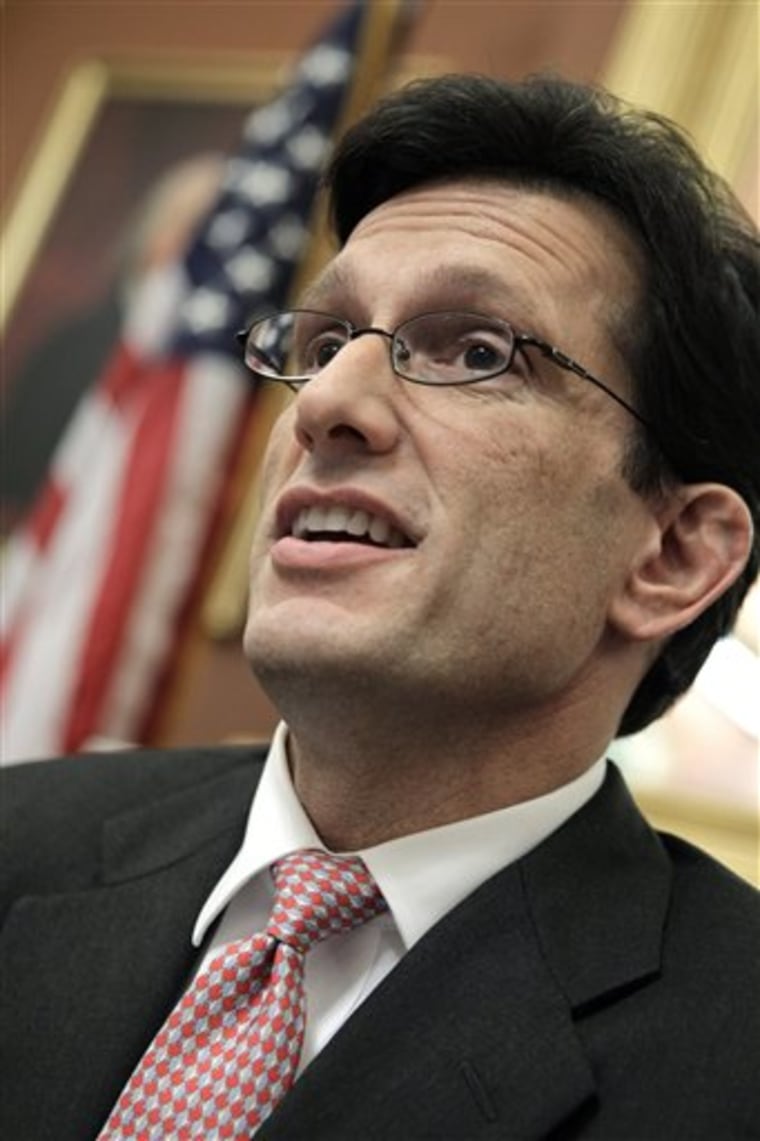Little more than a month after they backed sweeping changes to Medicare, Republicans are on the political defensive, exhibiting significant internal strains for the first time since last fall's election gains.
"We've got to get beyond this," Rep. Paul Ryan, R-Wis., said recently after several days of back and forth over the proposal he authored and included in the budget that cleared on a party line vote. "And we've got to get onto a serious conversation about what it takes to fix the fiscal problems in this country."
Under Ryan's proposal, Medicare would remain unchanged for those 55 or older, including the millions who now receive health care under the program. Anyone younger would be required to obtain coverage from a private insurer, with the government providing a subsidy to cover part of the cost of premiums.
In the weeks since the budget cleared, President Barack Obama led a Democratic attack, a special election in a reliably Republican House district in New York turned unexpectedly competitive and GOP presidential hopeful Newt Gingrich sharply criticized Ryan's proposal. Gingrich quickly apologized.
While defending his plan in Wisconsin and nationally, Ryan said he is open to changes, and a Senate vote tentatively set for this week on rival budgets has produced two Republican defections so far. Additionally, Republicans say they know of no plans to seek passage of legislation to implement the proposal.
'Growth agenda'
With Congress just back from a week's vacation, House Majority Leader Eric Cantor, R-Va., indicated Monday that Republicans want to change the subject. Without mentioning Medicare, he said the House majority has been focusing recently on "how to address the deficit (by) cutting back on the expenditures."
Now, he said, the GOP will present a "growth agenda."
Several strategists in both parties said in recent interviews the Republican proposals for Medicare are viewed more favorably when they are presented as part of a larger effort to fix the economy and create jobs.
For their part, Obama and other Democrats criticize the GOP proposal in narrow terms, an attack on a program that provides health care to millions.
Obama called the approach radical — the same term Gingrich used. Republicans want "to end Medicare as we know it," the president told an audience of invited guests, Ryan and other GOP lawmakers among them.
Privately, Republicans cite polling suggesting the Democratic charges are finding a receptive audience.
In one private poll circulated among Republicans in the past few weeks, 46 percent of those surveyed said they believed the GOP blueprint would reduce benefits for those over 55, including current beneficiaries. Another 41 percent said they believed it would not.
Dems use NY House race as test
Beyond the polling and the rhetoric, Democrats seized on a special election for a House seat in New York to test-market their attacks.
The Democratic candidate, Kathy Hochul, aired ads that said she wants to reduce government spending, but Republican rival Jane Corwin favors Medicare cuts "to pay for more tax cuts for multimillionaires."
Corwin counterattacked, accusing Hochul of wanting to cut Social Security.
Fearing defeat, the National Republican Congressional Committee has spent more than $400,000 on campaign activities. It aired an ad reminiscent of commercials that aired in 2010, and linked Hochul to House Democratic leader Nancy Pelosi.
In addition, American Crossroads, a GOP-aligned group, has spent nearly $700,000, much of it attacking Jack Davis, the third candidate in the race. A one-time Democrat, he is running as a Tea Party advocate.
"Jack Davis' presence is the only reason this is a competitive race," said Paul Lindsay, a spokesman for the National Republican Campaign Committee.
He said Medicare has not had an impact except that "Jane Corwin has shown that Republicans need to fight back on Medicare and call Democrats out for their scare tactics."
Democrats dispute that.
"I'm not saying we're going to win this but the fact that this is a competitive race in one of the most Republican districts in the country shows how Medicare is shaping" the campaign, said Rep. Steve Israel, D-N.Y., head of the Democratic Congressional Campaign Committee.
The issue "was a game changer," he said.
Heading into 2012
Win or lose, Democrats say they intend to take the issue into the 2012 campaign.
"This is a vote tabulation that you will see over and over again," Pelosi, D-Calif., said recently, referring to the 235-193 roll call that passed the budget. Only four Republicans opposed the measure, and no Democrats voted in its favor.
Ryan said last weekend he would "of course" be amenable to changing his proposal, and added, "This is the legislative process. But let's be clear: We are the only ones who have put out a plan to fix this problem" of soaring federal debt.
While Democrats have been relentless in attacking the proposal, Gingrich stirred controversy when he contrasted Ryan's approach to the new health care law Obama won from Congress.
"I don't think imposing radical change from the right or the left is a good way for a free society to operate," he said.
Criticized by fellow conservatives, Gingrich called Ryan to apologize. But a week later, he said he still opposes the Wisconsin lawmaker's call for denying those under 55 access to the current Medicare system.
